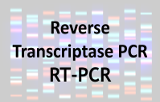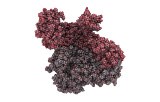
Reverse transcriptase PCR - RT-PCR
RT-PCR is a technique which makes it possible to make a PCR (polymerase chain reaction) from an RNA sample. RNA is first retrotranscribed by an enzyme called reverse transcriptase, which allows the synthesis of the complementary DNA (cDNA). The latter is then used to carry out a PCR. Reverse transcriptase or reverse transcriptase (RT) is an enzyme used by retroviruses and retrotransposons that transcribe the genetic information of viruses or retrotransposons from RNA to DNA, which can integrate into the genome of the host.
RT-PCR has been developed to use RNAs as a PCR amplification matrix. It is certainly the most sensitive method for detecting (and possibly quantifying) messenger RNAs at the level of an organ, tissue or cell. For this purpose, it is often carried out in situ (PCR in situ), ie on fixed biological material. It is also used for the construction of cDNA libraries, sorting of mRNA (Differencial Display RT-PCR) as well as the construction of DNA probes.



